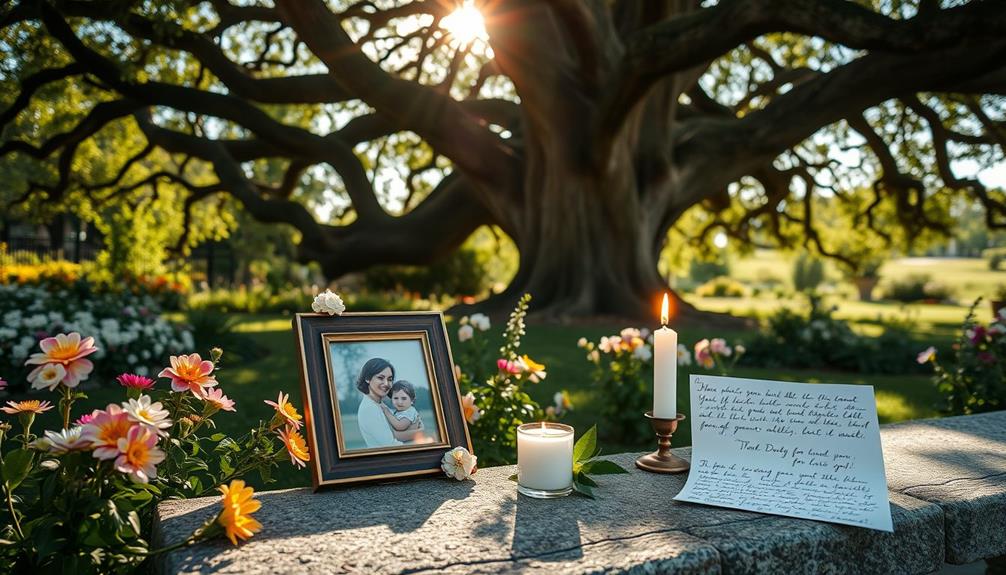Creating a memory box for your mom in heaven on her birthday is a beautiful way to celebrate her life and cherish those special moments. Start by gathering sentimental items like photos, birthday cards, and trinkets that evoke fond memories. Use a decorative box that reflects her personality, and personalize it with colors or quotes she loved. Each item captures a piece of her spirit, bringing comfort while honoring her legacy. This thoughtful tribute not only preserves memories but also helps in emotional healing. You'll discover even more creative ideas and tips to make this memory box truly special.
Key Takeaways
- Memory boxes serve as a heartfelt tribute, preserving joyful memories and celebrating the life of moms in heaven on their birthdays.
- Include sentimental items like birthday cards, photographs, and trinkets that evoke cherished moments shared together.
- Personalize the box with decorations reflecting her favorite colors and interests, enhancing emotional connection and comfort.
- Regularly update the memory box with new letters and keepsakes to keep the collection alive and meaningful.
- Engage with supportive communities to share experiences and find inspiration for creating and honoring memory boxes.
Understanding Memory Boxes
Memory boxes are powerful tools for preserving the essence of special moments and loved ones. When you create a keepsake box, you're not just storing items; you're curating a personal history filled with happy memories.
Memory box ideas can vary widely, reflecting your unique experiences and relationships. You might include photographs from family vacations, letters exchanged with friends, or small trinkets from significant events. Additionally, considering the emotional impact of relationships, such as those with family members who may have experienced the complexities of maternal influence, can add depth to your collection.
As you gather items for your memory box, consider what best represents your connection to those cherished moments. You could add childhood memorabilia or graduation gifts that remind you of accomplishments and milestones. Each piece tells a story, allowing you to relive those experiences whenever you open the box.
Memory boxes also serve as a comforting reminder during tough times, encouraging reflection on the joy and love that once filled your life. They strengthen bonds with future generations by sharing personal histories, ensuring your happy memories continue to resonate.
Purpose of a Birthday Memory Box

A Birthday Memory Box helps you cherish fond memories of your mom, capturing the essence of your shared moments on her special day.
By personalizing it with keepsakes like birthday cards and photographs, you create a unique tribute that reflects her legacy. This box not only honors her life but also provides comfort and a way to celebrate the love you shared.
Additionally, the act of creating this memory box can promote emotional healing, much like the strategies for heartbreak recovery, allowing you to process your feelings and celebrate her life in a meaningful way.
Cherishing Fond Memories
Creating a birthday memory box for moms in heaven often brings comfort and healing during difficult times. This heartfelt tribute serves as a beautiful way to honor her life and preserve cherished memories.
As you gather items for the memory box, think about including birthday cards, photographs from past celebrations, and small gifts that remind you of special moments you shared together. Each piece can evoke joy and reflection, allowing family members to celebrate her presence in their lives.
Adding personal notes or letters expressing your gratitude and love can deepen the emotional connection, making the box a cherished keepsake.
Consider including mementos like cake toppers from previous birthdays or decorations that represent her favorite colors. These items create a visual celebration of her life, reminding you of the happiness she brought.
Personalized Keepsake Ideas
Honoring a loved one with personalized keepsakes adds a special touch to a birthday memory box for moms in heaven. This box becomes a heartfelt tribute, allowing you to collect and preserve memories that truly celebrate her life.
Start by including birthday cards, photos from past celebrations, and small trinkets that remind you of her. Each item acts as a connection to cherished moments, ensuring she stays close to your heart.
You can further personalize the memory box by decorating it with her favorite colors or quotes that reflect her unique personality. Adding handwritten notes or letters expressing your love and gratitude creates a deeper emotional impact.
These personalized gifts transform the box into a treasured keepsake that you can revisit during birthdays.
Consider updating the memory box annually with new items, keeping it a living collection that evolves as you continue to celebrate her memory each year.
As you fill the box with things that remind you of her, you'll find comfort and connection, making each birthday a meaningful reflection of your love for her.
Materials Needed for Your Box

When you're ready to assemble a memory box for your mom in heaven, start by gathering essential materials that will help you capture and celebrate your cherished memories. First, pick out some printed scrapbook paper to create a beautiful backdrop for your photos and mementos. This will give your memory box a personal touch.
To add an extra layer of warmth, consider incorporating materials that reflect her personality or interests, just like how unique Akita names for exotic breeds can reflect a dog's character.
Next, collect trinket items that hold special meaning, like jewelry, handwritten notes, or small keepsakes that remind you of her. These can be placed in a wooden craft box, adding depth to your collection.
To enhance the visual appeal, consider using twine or raffia to craft a unique pull-out display for your photographs.
You'll also need some tools to effectively assemble and secure your items. Make sure you have scissors or a paper cutter, transparent tape, and double-sided craft tape or a glue stick handy.
Step-by-Step Crafting Instructions

Now that you've gathered all the materials for your DIY Memory Box, it's time to start crafting. Follow these step-by-step instructions to create a beautiful tribute to your family member.
| Step | Instructions |
|---|---|
| 1 | Cut the scrapbook paper to fit the interior of the trinket box, making it about an inch smaller than the box opening. |
| 2 | Use double-sided tape or glue to attach printed photos of your mom and memorable moments to the paper squares. |
| 3 | Take the twine and create a pull-out feature by attaching it securely within the box. Place trinkets that remind you of her at the midpoint of the twine. |
| 4 | Personalize your memory box by adding sentimental items like birthday cards, drawings, and small keepsakes that celebrate her life. |
Each step helps you make a memory that honors her spirit. Once completed, your memory box will not only be a beautiful display but also a heartfelt collection of cherished moments. Embrace the process, and enjoy creating this special keepsake that reflects your love for her.
Creative Items to Include

When creating a memory box for your mom, think about including sentimental keepsakes and mementos that spark joy.
Personal letters and notes can express your love and share cherished memories, while favorite photos capture the special moments you shared together.
These creative items will help celebrate her life and keep her memory alive in your heart.
Sentimental Keepsakes and Mementos
Creating a memory box for your mom in heaven can be a deeply meaningful way to preserve her spirit and celebrate the love you shared. Start by including heartfelt birthday cards received from family and friends. These cards capture messages of love and fond memories that remind you of her special day.
Next, add photos from past birthday celebrations, as they evoke cherished moments spent together. You might also want to include little things like pressed flowers from those celebrations or small trinkets, such as a charm from a family gathering, that carry significance in your shared experiences.
Consider creating a mini scrapbook page featuring your favorite birthday memories, filled with handwritten notes or quotes that truly reflect her personality and spirit.
Personalized Letters and Notes
Capturing the essence of your relationship with your mom through personalized letters and notes can be a beautiful way to express your love and honor her memory.
These heartfelt messages allow you to reflect on cherished moments and the impact she'd on your life. Including personalized letters in her memory box creates a lasting tribute.
Here are some ideas for what to include:
- Handwritten Notes: Share your favorite quotes, special memories, or anecdotes that celebrate her birthday, giving a personal touch that evokes nostalgia.
- Family Contributions: Gather letters from family members or friends, showcasing the love and impact she'd on others, deepening the emotional significance of the memory box.
- Creative Touches: Add drawings or crafts made by children or grandchildren. These personal creations bring warmth and joy, honoring her legacy in a unique way.
Consider using decorative stationery or themed paper that reflects her personality.
This not only enhances the visual appeal but also makes the personalized letters feel even more special. Your memory box will become a heartfelt tribute filled with love and remembrance.
Favorite Photos and Memories
Including favorite photos in your memory box can greatly enhance the emotional depth of your tribute to your mom. Choose images that capture memorable moments together, like family gatherings, vacations, or celebrations. These snapshots will evoke cherished memories, especially on her birthday.
To make it even more special, consider adding handwritten notes or letters that express your love and gratitude. These heartfelt reminders of your bond will bring comfort and warmth as you reflect on her influence in your life.
You might also want to include small trinkets that represent special times, such as a piece of jewelry she wore or a dried flower from her garden, creating a tangible connection to her presence.
Don't forget to add birthday cards or messages from previous years to highlight the joy she brought to your life during celebrations.
Finally, use decorative elements like themed scrapbook paper or embellishments that reflect her personality and interests. This will enhance the overall aesthetic of your memory box, making it a true representation of the love you shared.
Each item will serve as a beautiful tribute to your mom, keeping her memory alive.
Personalization Ideas for Mom

Often, personalizing a memory box for your mom can make it feel even more special and meaningful. Here are a few ideas to help you personalize the memory box and honor her memory:
1. Heartfelt Letters: Write notes expressing your love and sharing cherished memories. These heartfelt letters can provide comfort and a sense of connection, making her feel close to you even in spirit.
Additionally, consider including letters that reflect shared experiences, similar to how cats show affection upon owner's return through their unique behaviors.
2. Favorite Photographs: Include photographs capturing her happiest moments—birthdays, family gatherings, and special occasions. These images evoke cherished memories and celebrate her life, allowing you to relive those joyful times.
3. Personal Mementos: Add small trinkets that reflect her hobbies or interests. Whether it's a piece of jewelry she adored or a gardening tool, these items can represent her personality and passions, making the memory box uniquely hers.
You can also use decorative elements, like scrapbooking paper in her favorite colors, to enhance the visual appeal.
Remember to include birthday cards or messages from family members to create a collective tribute, showcasing the love and remembrance of your mom on her special day.
Tips for Displaying Your Memory Box

After personalizing your memory box for your mom, displaying it in a way that honors her memory is just as important. Choose a decorative box that reflects her personality, like one in her favorite color. Make sure to create a themed backdrop using printed scrapbook paper and twine to enhance the overall aesthetic.
To showcase cherished memories, use clear photo frames or attach photos directly to the box's interior with double-sided tape. Arrange the contents thoughtfully by placing significant items like cards prominently, while balancing smaller trinkets around them to create visual interest.
Consider adding a personalized label or a small plaque detailing the box's significance, offering a touching reminder of your mom on her birthday. Here's a quick reference table to help guide your display:
| Display Tip | Description |
|---|---|
| Choose the Right Box | Select one that reflects her personality. |
| Create a Themed Backdrop | Use scrapbook paper and twine for visual appeal. |
| Arrange Thoughtfully | Balance significant items with smaller trinkets. |
Sharing Your Memory Box Journey

As you commence on the journey of creating your memory box, consider documenting the process to capture the emotions and memories that arise. Engaging in this meaningful project can also help foster connections with others who are experiencing similar feelings of loss and remembrance.
Sharing your memory box journey not only allows you to reflect on your feelings but also connects you with others who understand your experience. Here are three ways to document your journey:
- Photography: Take pictures of each item you add to your memory box. This visual record will help you look back and relive those cherished moments. You might also find inspiration in crazy games that can create fun memories with friends as you share your journey.
- Journaling: Write down your thoughts and feelings as you create your box. Describe why each item is meaningful and how it celebrates your mom's life.
- Engaging with Communities: Share your journey in online groups or support networks. You'll find inspiration from others and can exchange ideas on what to include in your box.
Frequently Asked Questions
How to Make a Memory Box for a Deceased Loved One?
To make a memory box for a deceased loved one, start by choosing a decorative box that resonates with you.
Gather meaningful items like photographs, letters, and trinkets that remind you of your cherished moments together.
Organize these items by theme or event, adding personal touches like scrapbook paper.
Regularly update the box with new memories to keep it alive and to honor their memory, providing comfort as you reflect on your time together.
How Do You Make a Good Memory Box?
They say memories are timeless treasures, and creating a good memory box is a beautiful way to capture them.
Start by choosing a sturdy, attractive container that reflects your personality. Gather meaningful items like letters, photos, and trinkets that spark joy.
Use scrapbook paper for personalized photo frames and organize your keepsakes by themes. Enhance it with decorative elements, and leave space for future additions, so it evolves just like your memories do.
What to Put in a Special Box?
When you're putting together a special box, think about including heartfelt letters or notes that express your love and gratitude.
Add cherished photos capturing joyful moments you've shared. Mementos like birthday cards or gifts can bring back sweet memories.
Don't forget a small keepsake symbolizing something she loved, like a favorite flower or piece of jewelry.
How to Make a School Keepsake Box?
Making a school keepsake box is a rewarding project, even if you think you don't have enough items.
Start with a sturdy box that you love, then gather report cards, artwork, and photographs. Use scrapbook paper to create beautiful backgrounds for each piece.
Organize everything chronologically or by theme, and don't forget to personalize it with your child's name or school colors.
This box will capture and celebrate their educational journey beautifully!
Conclusion
As you create your birthday memory box for Mom, remember that while she's not here to celebrate, her spirit thrives in every cherished item you include. Ironically, the act of crafting this box turns your grief into a celebration of her life. Each piece tells a story, reminding you of the joy she brought. So, as you gather your memories, you'll find that it's not just a box—it's a heartfelt tribute, transforming sorrow into treasured moments of love.










